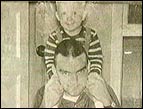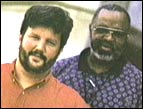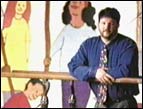Streett Preacher
CBN.com It snows a lot in Indianapolis in the winter. January 1978 was no exception. Alan and Sally Streett took an arm-in-arm stroll in the snow. Then Alan kept his promise to shovel the driveway. Their 15-year-old son, Tim, came out to help.
"I remember as a child, him [my dad] not being afraid to take me out of school for a day just to go off together and do something fun, just the two of us. My being the only son, I think he took particular pleasure in teaching me how to play tennis, playing sports together, and things like that. We had a very good relationship," says Tim Streett.
 Across town, three teenage boys were smoking pot and were piling into a car. They had nothing to do, so one of them had an idea. They cruised through a neighborhood, saw a man outside, and robbed him. It was easy. Next was an elderly woman. Then they saw a father and son shoveling the driveway.
Across town, three teenage boys were smoking pot and were piling into a car. They had nothing to do, so one of them had an idea. They cruised through a neighborhood, saw a man outside, and robbed him. It was easy. Next was an elderly woman. Then they saw a father and son shoveling the driveway.
"Most of my life theres been -- pre- that date, and post- that date, pre- the murder, and post- the murder -- I wouldnt call it the driving force, but its the pivotal point of my life. Obviously, the world changed dramatically. My outlook on the world changed dramatically," he says.
Alan Streett was shot and killed that January night for no reason whatsoever. Tim was left to grow up without the dad he adored.
"I was raised in a Christian home where we were taught about the Bible and about the Lord Jesus," says Tim. "I made a commitment to accept Him as my Savior when I was in the 8th grade. My father was a Presbyterian chaplain in the Army. I know that thats why, in the years immediately following my fathers death, things didnt fall apart for me."
But they did later. In college, Tim struggled to make sense of his faith.
"As a kid Id heard so much that the Christian life was about having a disciplined quiet time and about memorizing Scripture and all this other stuff, and Id been doing that for so long, I was tired of it," he says. "In the back of my mind, I think I was probably tired of working so hard and yet my dad still died. Here I was working so hard, and bad things still happened. I cant say I ever felt bitterness, but I certainly got tired of paying attention to the Lord and decided not to for a while."
After college, Tim drifted from job to job. He started using drugs to fill the emptiness he felt. Driving home from a party one night, a song on the radio summed up his feelings.
Says Tim, "The line in the Bruce Springsteen song is 'sometimes its like someone took a knife all edgy and dull and cut a six-inch valley through the middle of my soul.' Having grown up with the Christian background that I did, I knew what that longing was. I knew what that hole was it was that I had taken a knife and cut the Lord out, and I knew where to find what would fill that hole again."
Tim says he pulled over right then and recommitted himself to the Lord. As his faith revived, he started to see clearly what his life would be about.
He recalls sitting at the murder trial with his mother.
 "She said she remembers me looking at them and seeing the look on my face," says Tim. "While she felt a lot of bitterness and hatred, she said she could see in my face I did not. Thats when I turned to her and said, 'Mom, someday I want to work with kids in the city.'"
"She said she remembers me looking at them and seeing the look on my face," says Tim. "While she felt a lot of bitterness and hatred, she said she could see in my face I did not. Thats when I turned to her and said, 'Mom, someday I want to work with kids in the city.'"
Tim went to seminary, became a minister, and married. Later, he did an internship at an urban ministry that focused on racial reconciliation.
"As a result of that," he says, "I had some significant relationships with some men who lived in the [black] community and African-American men who didnt live in the community. It was through those relationships that I began to have some of my own stereotypes and prejudices broken down."
In a sermon one Sunday, God seemed to be speaking right to Tim.
"He said, 'Those men can preach powerfully about reconciliation and forgiveness because they have forgiven, and you have not. You need to do that,'" Tim recalls.
So 17 years after his fathers murder, Tim Streett sat down and wrote a letter to the killer.
"I had always said to myself, I will forgive him when he shows some remorse, some repentance. He had maintained his innocence all along, very defiantly, and I think the Lord told me that morning, 'I went to the Cross and forgave you before you asked, and you need to do the same.'"
Tim got no response to his letter. Then he wrote to the two men involved.
"In my letter, which basically expressed forgiveness, I said, 'If youd ever want me to come visit you, I will,' and I got a letter back in about three days, which means he responded pretty quickly, saying, 'Id love for you to come up and see me.'"
Don Cox was the driver of the car the night of the murder. After nearly two decades, Tim was about to meet him face to face.
 "For the first time in my life, I remember looking down at my shoes and something was saying to me, for the first time in my life, Youre really wearing Jesus shoes. Don came over, and I dont know why, but we just kind of hugged and sat down and started talking," says Tim. "I dont know why, but we really hit it off. Whatever bitterness I held began to disappear, and I began to really know what it meant to love another person, to love your enemy.
"For the first time in my life, I remember looking down at my shoes and something was saying to me, for the first time in my life, Youre really wearing Jesus shoes. Don came over, and I dont know why, but we just kind of hugged and sat down and started talking," says Tim. "I dont know why, but we really hit it off. Whatever bitterness I held began to disappear, and I began to really know what it meant to love another person, to love your enemy.
Tim is now passionate about reaching inner city kids before they wind up in prison. He moved into the inner city of Indianapolis. And as the outreach minister of East 91st Street Church, Tim helps manage Jireh Sports Center. Its a revamped warehouse that gives kids a place to go besides the streets. They teach gymnastics and preach Christian character.
"I just felt God, somehow in advance of me even knowing, giving me an early indication that thats how He would transform my heart to love these kids, and He has," Tim explains.
As Tim talks forgiveness, he has practiced what he preaches.
"The Scriptures make it clear that were commanded to forgive; were not commanded to feel like forgiving. Its just saying, 'God youve commanded me to this, so Im going to write this letter. I dont feel like it, but Im going to write the letter, and Im praying that You do this work in my heart so that the feelings come.' In my case, they did after the obedience," he says.




